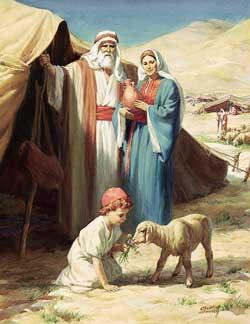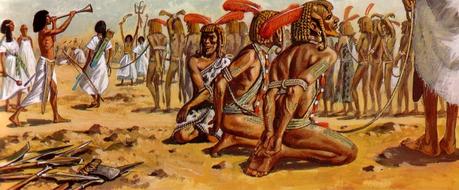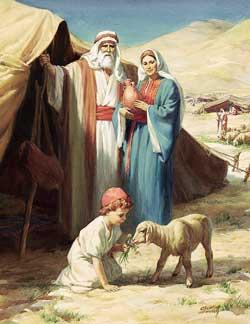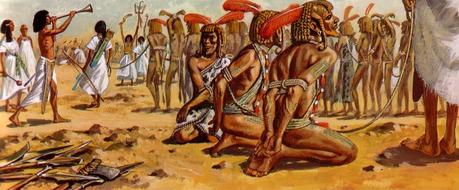--------

Hacía tiempo que no actualizaba esta serie-reflexión sobre el Génesis, así que allá voy con la última parte. Lo último que había comentado era que de la descendencia de Noé descendemos nosotros. Ahora me gustaría saltar hasta la historia del patriarca Abraham para comentar lo siguiente: "Pero también por causa de Sarai, el Señor castigó al faraón y a su familia con grandes plagas."
Os pongo primero en contexto. Esta cita procede del Génesis 12-17, y hace referencia a la llegada de Abraham y Sarai a Egipto, donde el faraón se interesó de inmediato por Sarai, y por desear a la mujer de otro Dios le castigó a él y a su familia con las plagas. El castigo puede parecer severo, pero lo que resulta al final es del todo ilógico, ya que el faraón no tenía ni idea de que Sarai ya era la mujer de Abraham. Es más, Abraham le había pedido a su mujer que dijera que en realidad eran hermanos, para que a él no le mataran. En realidad, lo de hermanos es cierto, porque Abraham y Sarai tienen el mismo padre pero no la misma madre, y supongo que la procedencia materna es la que marca la diferencia en la tradición judía. El tema aquí es que el castigo de Dios, viéndolo de esta manera, no tiene sentido. De hecho, más adelante hay otro ejemplo exacto, pero prefiero ir por orden. Otra de las palabras que con más asiduidad se repite a lo largo del Génesis es "esclavos". Tener esclavos, aunque era un abuso muy corriente en la antigüedad y los propios profetas de Israel lo denunciaban, parecía no preocupar demasiado a Dios ya que nunca castigaba al ser humano por esta acción. Esto me llevó a una conclusión que tiene que ver con la libertad a la hora de ser el dueño de la vida de uno mismo: nadie elegía libremente ser esclavo o ser abusado, y si se decidía así, era por cuestión de extrema necesidad, pero aún así Dios lo permitía; en cambio, las decisiones libres entre personas adultas, como el sexo antes del matrimonio, se condenaban con severidad. En resumen, elegir lo que hacer con tu propia vida podía costarte sufrir la ira de Dios.

Al hilo del abuso, hay un pasaje en el Génesis 19-5 que resulta ciertamente chocante: "- ¿Dónde están los hombres que vinieron a tu casa esta noche? ¡Sácalos! ¡Queremos acostarnos con ellos! Entonces Lot salió a hablarles y cerrando bien la puerta detrás de él les dijo: - Por favor, amigos míos, no vayáis a hacer una cosa tan perversa. Yo tengo dos hijas que todavía no han estado con ningún hombre; voy a sacarlas para que hagáis con ellas lo que queráis, pero no les hagáis nada a estos hombres, porque son mis invitados."
¡Todo un anfitrión este Lot! Aunque no sé yo si buen padre... Esto ocurría en Sodoma, y según las costumbres del antiguo Oriente, la obligación de proteger la vida de un huésped era aún más importante que el honor de una mujer, aunque fuera de tu propia familia. Como es obvio, hoy en día se reprueba este comportamiento por su bajeza moral, pero lo que se nos pide que tengamos en cuenta a la hora de analizar ciertos pasajes en la Biblia es que la época no era la misma, así que la moralidad tampoco era la misma que ahora. Pues bien, creo que este planteamiento pone en una posición muy peligrosa al propio Dios. Si aceptamos que la ética y la moral dependían de la época, tenemos que aceptar entonces que el mal no depende de Dios, y si no depende de Dios es que Dios no tiene control sobre eso, y si Dios no tiene control sobre eso es porque Dios no es Todopoderoso. A partir de aquí, que cada uno saque sus propias conclusiones. Antes de que se me olvide, ¿os acordáis de la promesa que le hizo Dios a Noé de que no iba a volver a destruir a la humanidad con un diluvio? Pues Sodoma y Gomorra ardieron bajo el fuego que envió Dios para acabar con la vida de todos los que allí vivían. Dios será el bueno de la historia, pero desde luego está demostrando tener tanta malicia y picardía como el Diablo, que hasta ahora no ha hecho acto de presencia.

A veces pienso que Dios es un poco troll
Para acabar, voy a señalar otros puntos donde la actuación de Dios no parece guiarse por la lógica. Uno de esos momentos aparece en el Génesis 41-30 "Será tan grande la escasez, que no quedarán señales de la abundancia que antes hubo. Su Majestad tuvo el mismo sueño dos veces, porque Dios está decidido a hacer esto, y lo va a hacer muy pronto."
Se trata de un sueño que José le interpreta al Faraón, y donde le explica las penurias por las que Egipto tendrá que pasar después de haber vivido años muy opulentos. Las veces que Dios ha hecho esto ha sido por imponer un castigo, pero no se explica la razón por la que Dios le haría algo así a la población egipcia; es un castigo que no tiene justificación, como tampoco tiene justificación lo siguiente: "Cómpranos a nosotros mismos y a nuestras tierras a cambio de trigo. Seremos esclavos del faraón y trabajaremos nuestras tierras para él, con tal de que nos des semilla para que podamos vivir y para que la tierra no se eche a perder. ¿Por qué has de dejarnos morir junto con nuestras tierras?
Este pasaje del Génesis 47-19 ya se corresponde al momento de escasez de los egipcios, y ellos voluntariamente se entregan al faraón como esclavos para sobrevivir. Como ya había mencionado antes, el esclavismo era un abuso que Dios nunca castigaba, y si tenían que llegar a esa condición, ¿se podría considerar como otro castigo sin explicación por parte de Dios? Hasta aquí mi análisis sobre el Génesis. La siguiente parada, será el Éxodo.
Audiolibro: Génesis
Película: El Génesis
No olvidéis que podéis visitar todos los vídeos en este link
Todos los comentarios son bienvenidos.
Fuente de las imágenes:
http://www.buenanueva.net/biblia/1-biblia1er_Grado/3_biblia1-abraham.html
http://elmagazindemerlo.blogspot.com.es/2014/02/la-esclavitud-no-es-tan-antigua-como-la.html
http://elmostacho.com/el-mito-se-desmiente-el-dios-de-los-troll-existe/----------

Long time ago since I updated this reflection-series about the Genesis, so here I go with the last part. The last thing I commented was that we all are descendants of Noah's descendants. Now I would like to go to Abraham's story to discuss about the following words: "Because of Sarai, the Lord struck the king and everyone in his palace with terrible diseases."
I'm going to put you in context first. This quotation comes from Genesis 12-17, and it has to do with Abraham and Sarai's arrival to Egypt, where the king got immediately interested in Sarai, and due to his desire for another man's woman, God punished him and his family with diseases. That punishment seems to be severe, but at the end, this comes to be quite illogic because the king had no idea that Sarai was Abraham's wife. Moreover, Abraham asks Sarai to say that they are siblings to avoid be murdered. Actually, they are real siblings because they have the same father but not the same mother, and I guess that the procedence from the mother is what makes the difference in the jewish tradition. The topic here is that God's punishment, since this point of view, makes no sense. In fact, there is another exact example futher on, but I prefer to go step by step. Another word which is often employed through the whole Genesis is "slaves". To own slaves, although it was a very common abuse in old times and even the prophets of Israel denounced it, did not worry God very much because He never punished human beings for such actions. This brought me to a conclusion related to freedom when it comes to be the owner of oneself's life: no one chose to be a slave or to be abused freely, and if that was a personal choice, it was because of exceptional necessity, but still God allowed it; on the other hand, freedom of choice between adults, like sex before marriage, was severely condemned. To sum up, to decide what to do with your own life could cost you to suffer God's rage.

Related to the abuse, there is a passage in Genesis 19-5 which is really shocking: "- Where are your visitors? Send them out, so we can have sex with them! Lot went outside and shut the door behind him, then he said: - Friends, please don't do such a terrible thing! I have two daughters who have never been married. I'll bring them out, and you can do what you want with them. But don't harm these men. They are guests in my home."
What a host Lot is! Although I don't know if he's a good father... That occured in Sodom, and according to Ancient Orient's customs, the duty of protecting a guest's life was even more important than a woman's honor, although she belonged to your family. Obviously, nowadays such behaviour is condemned because of its low level of morale, but what we are asked to take in consideration in order to analyze specific passages of the Bible is that it's not the same period of time in history, so morality was not the same. Well, I think this thought puts God in danger. If we accept that ethics and morality were depending on the period of time, then we have to accept that evilness does not depend on God, and if that does not depend on God then God has no control over it, and if God has no control over it then God is not almighty. From this part, everyone should take their own conclusions. Before I forget it, do you remember the promise God made to Noah of not destroying humanity with another flood ever? Sodom and Gomorrah burned under the fire God sent to kill everyone living there. God will be the good guy in the story, but no doubt that He shows to have as slyness and maliciousness as the Devil, who has not appeared for the moment by the way.

Sometimes I think that God is a troll
To finish, I'm going to remark other points where God's acts are not guided by logic. One of these moments happens in Genesis 41-30: "The famine will be so bad that no one will remember that once there had been plenty. God has given you two dreams to let you know that he has definitely decided to do this and that he will do it soon."
This is a dream interpreted by Joseph to the king, where he explains to him all the scarcities Egypt will have to endure after very wealthy years. Everytime God has done something like that is to impose a punishment, but no reason is given to understand why God would do that to the egyptian people; this is an unjustified punishment, as the one which comes next: "We have nothing left except ourselves and our land. Don't let us starve and our land be ruined. If you'll give us grain to eat and seed to plant, we'll sell ourselves and our land to the king. We'll become his slaves."
This passage from Genesis 47-19 is within the context of famine among egyptians, and they freely decide to be slaves of the king to survive. As I mentioned before, slavery was an abuse never punished by God, and if they were forced to live under such conditions, could be considered as another inexplicable punishment imposed by God? End of my analysis about the Genesis. The next stop will be the Exodus.
Audiobook: Genesis
Don't forget you can visit all the videos using this link
All comments are welcome.
Images source:
http://www.buenanueva.net/biblia/1-biblia1er_Grado/3_biblia1-abraham.html
http://elmagazindemerlo.blogspot.com.es/2014/02/la-esclavitud-no-es-tan-antigua-como-la.html
http://elmostacho.com/el-mito-se-desmiente-el-dios-de-los-troll-existe/---------

